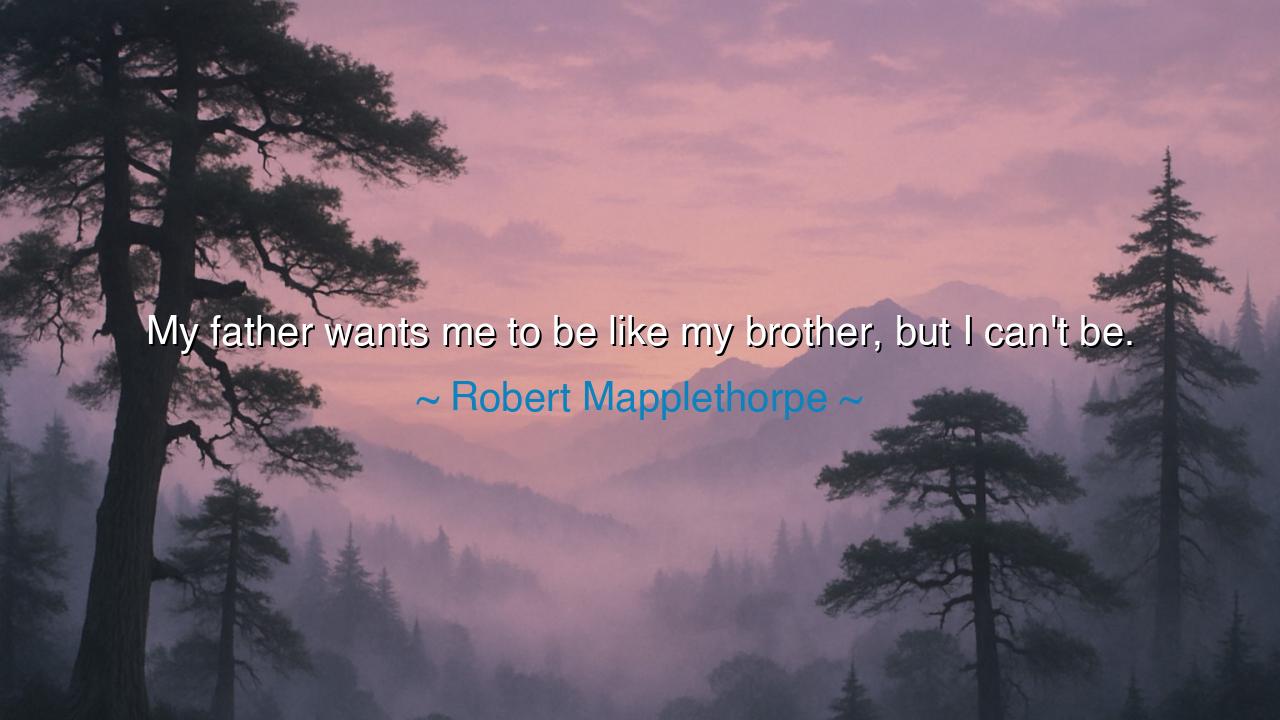
My father wants me to be like my brother, but I can't be.






In the words of Robert Mapplethorpe, “My father wants me to be like my brother, but I can’t be.” These words, though simple in form, carry the weight of generations — the eternal struggle between expectation and individuality, between the world that shapes us and the soul that seeks to be free. Mapplethorpe, a visionary photographer whose art challenged convention and provoked both reverence and outrage, spoke not only of his own life but of the universal conflict that every human heart endures: the desire to be loved for who we are, not for what others wish us to become. His statement is a cry of identity, a declaration that the path to truth often begins in the courage to disappoint.
The origin of this quote lies in the tension between Mapplethorpe’s creative spirit and the conservative world in which he was raised. Born into a traditional Catholic family, he grew up in an environment that valued order, respectability, and conformity. His father, a man of discipline and conventional values, saw in Robert’s brother a model of success — grounded, obedient, and safe. But Robert was drawn to the margins, to the wild beauty of the forbidden, to art that explored desire, shadow, and the divine in defiance of the ordinary. When he said, “I can’t be,” it was not rebellion for rebellion’s sake — it was truth. He could not betray the call of his own nature, for to do so would have been a living death.
The ancients, too, spoke of this struggle. The Greek philosopher Socrates, when commanded by the state to silence his questioning and conform to the will of Athens, refused. “I cannot,” he said in his own way, and drank the hemlock rather than live against his inner voice. Like Mapplethorpe, he understood that obedience without authenticity is emptiness. To betray one’s essence for approval is to lose the soul’s fire — and no praise, not even a father’s, can replace that loss. The courage to differ is among the highest forms of virtue, for it honors both truth and individuality, even when the world does not understand.
There is pain in Mapplethorpe’s words, for the love of a father is a powerful force, and the longing for his approval burns deeply. Yet, there is also dignity — the quiet heroism of one who stands in the light of his own difference. To say, “I can’t be,” is to acknowledge limitation not as weakness, but as fidelity to the self. The heart that follows its own design will often walk a lonely road, for many fear what does not resemble them. But the artist, like the prophet, does not exist to please; he exists to reveal. Mapplethorpe’s life, his art, and even his suffering became an act of truth-telling — a confrontation between the beauty of individuality and the rigidity of expectation.
Consider the tale of Vincent van Gogh, another soul who bore the same burden. His family longed for him to be respectable, to succeed as a clergyman or tradesman. But Vincent, restless and aflame with vision, could not deny his art. His father saw madness where there was genius, recklessness where there was passion. He too could not be the son his father wanted — and though he died in obscurity, the world would later awaken to his truth. Like Mapplethorpe, Van Gogh’s legacy is not one of conformity, but of authentic creation, proof that the spirit cannot be tamed without extinguishing its light.
Mapplethorpe’s quote speaks, therefore, not only to artists, but to all who have ever stood at the crossroads between expectation and authenticity. It is a call to self-acceptance, to the recognition that each soul is fashioned with its own purpose, its own music. The father’s will, the family’s ideal, the world’s demand — these are the voices of order, but the soul’s voice is the whisper of creation itself. When those voices clash, the brave must choose the inner truth. To do otherwise is to inherit peace in the eyes of others, but turmoil in the heart.
The lesson, then, is both tender and profound: do not measure yourself by another’s image of you. Whether it is a parent, a teacher, or the world itself, no one can define your path but you. You owe gratitude to those who raised you — but you owe loyalty to the truth within. Seek not to imitate, but to embody; not to please, but to live honestly. For the parent’s love may wish for safety, but the soul demands freedom — and freedom, though it costs misunderstanding, gives the only kind of happiness that endures.
So remember the wisdom hidden in Robert Mapplethorpe’s quiet confession: “My father wants me to be like my brother, but I can’t be.” It is not defiance, but destiny. Each of us carries a flame that burns in its own shape and color, and the world is dimmed when that light is forced to imitate another. Let your life be your own art — fierce, true, and unrepeatable. For in the end, it is better to live misunderstood but authentic than praised but false; better to walk alone in truth than surrounded in approval built on denial. This is the path of all who seek to honor the divine spark of individuality — the sacred “I am” that no expectation can ever extinguish.






AAdministratorAdministrator
Welcome, honored guests. Please leave a comment, we will respond soon